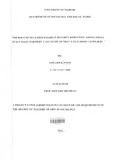| dc.contributor.author | Boor, Edward K | |
| dc.date.accessioned | 2013-02-12T14:48:24Z | |
| dc.date.available | 2013-02-12T14:48:24Z | |
| dc.date.issued | 2012 | |
| dc.identifier.uri | http://erepository.uonbi.ac.ke:8080/xmlui/handle/123456789/9691 | |
| dc.description.abstract | The aim of this research study was to analyze the socio-economic role of milk processors to poverty and hunger reduction among small scale dairy farmers. Processors playa critical role in the dairy sector of value addition but mostly have been perceived to be exploiting dairy farmers but the truth is that processing increases shell life of milk and thus cre!tes demand for more which eventually the farmer benefits.
Specific objectives of this study were to establish the extent to which milk processing had increased raw milk supply from the dairy farmers and also to examine the decision making role of dairy farmers in influencing processors to act on matters relating to farmers interests. This involved documenting the intervention measures by the dairy industry players.
This study took a multiplicity of theories to provide the basic theoretical framework for analyzing the socio-economic effects of milk processing and the dairy industry as whole. The theories included; Maslow's hierarchy of needs, structural functional theory and the rational choice theory.
A lot of literature was reviewed on the dairy industry especially matters on milk processing. Furthermore policies and regulations of the dairy industry were reviewed .Much literature was reviewed especially touching on poverty and food security.
The researcher looked at literature from the international perspectives then narrowed down to specifically Kenyan context which cumulated the extent at which milk processing contributes to poverty reduction in Uasin Gishu. The study employed descriptive study as research design; with the target population of 100 small scale dairy farmers and 7 dairy sector stakeholders. Data was obtained through interview guides, document analysis and questionnaires. The data was summarized into frequencies, percentages, charts and tables. The findings showed that the dairy sector supports a lot of livelihoods and there is need for combined efforts by all the concerned parties to work harmoniously in order to address poverty and hunger. Much effort should be at policies and legislation but more so is on inefficiencies at farm and processing levels. | en_US |
| dc.language.iso | en_US | en_US |
| dc.publisher | University of Nairobi, Kenya | en_US |
| dc.title | The role of milk processors in poverty reduction among small scale dairy farmers: case study of NKCC Ltd Eldoret suppliers | en_US |
| dc.title.alternative | Thesis (MA) | en_US |
| dc.type | Thesis | en_US |

